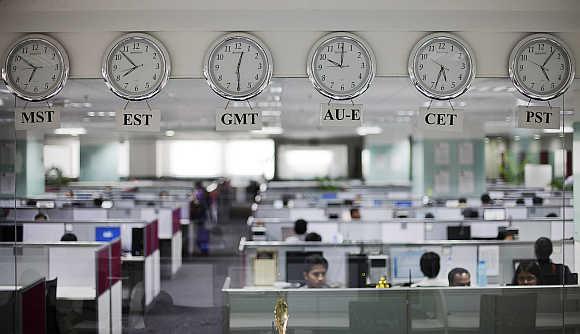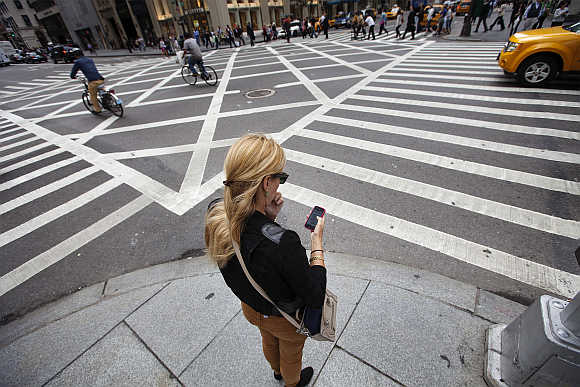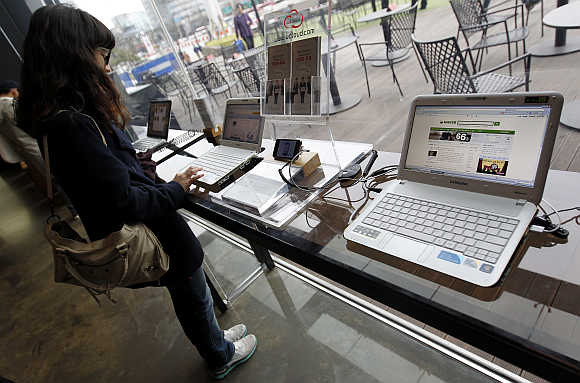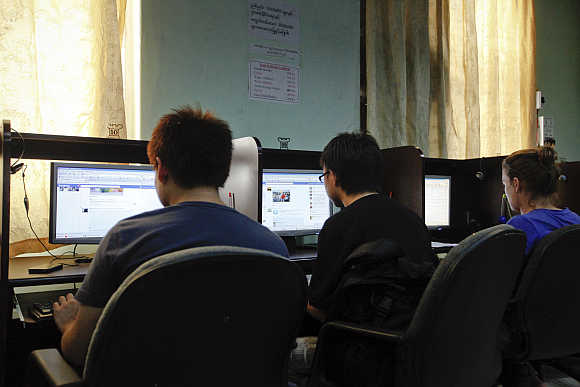Photographs: Vivek Prakash/Reuters Syed Tashfin Chowdhury in Dhaka
About a third of the world's population has access to Internet. However, more needs to be done in order to achieve Internet penetration targets set out in the Millennium Development Goals, said an International Telecommunications Union's Broadband report in September.
The report released by the ITU's Broadband Commission for Digital Development and titled "State of Broadband 2012" evaluated the deployment of broadband services around the world in 170 countries. It also tracked progress towards achieving targets set by the commission regarding increasing the affordability and use of broadband.
...
Where does India rank in Internet access? Find out...
Image: Tourists use an iPad tablet in front of Rome's ancient Colosseum.Photographs: Tony Gentile/Reuters
The report further said that by 2020, connected devices would outnumber connected individuals by a ratio of six devices to every person online. Also the report stressed that while household access was increasing at an acceptable rate, individual Internet use was continuing to lag behind.
The ITU said that mobile broadband could provide a platform for achieving an increase in individual use. By the end of 2011, the report said, new mobile broadband subscriptions were outstripping fixed connections by two to one.
The report also notes that a "strong linguistic shift is now taking place online". If current rates of growth continue, the number of users accessing the Internet in languages other than English (primarily Chinese) will outstrip English language users by 2015.
...
Where does India rank in Internet access? Find out...
Image: Women use smartphones in front of the Trevi Fountain in Rome.Photographs: Tony Gentile/Reuters
Social network participation was also ranked, with the Philippines coming in in the top spot, with more than 70 per cent of active Internet users using social networking sites. Indonesia came in a close second, with Malaysia, Brazil and Russia rounding out the top five. The global average rate was around 55 per cent, the report said.
Currently, 20.5 per cent of households in developing countries have access to Internet, which the ITU says puts them on target to achieve the 40 per cent target by 2015.
The report ranked countries based on their rates of Internet use.
...
Where does India rank in Internet access? Find out...
Image: Woman looks at her iPad tablet after the Emporio Armani Spring/Summer 2013 collection at Milan Fashion Week.Photographs: Stefano Rellandini/Reuters
Iceland, at 95 per cent, boasts the world's highest Internet usage rate, while Timor Leste has the lowest rate at 0.9 per cent. The United States ranks at 23 in the world in percentage of individuals online in 2011.
The nations of South Asia have also achieved substantial ranks according to the report. However, as smaller nations have comparatively higher proportion of Internet users with smaller population, countries like Maldives, Sri Lanka and Nepal has fared better than India, Pakistan and Bangladesh.
...
Where does India rank in Internet access? Find out...
Image: A woman uses her Apple iPhone while waiting to cross Fifth Avenue in New York.Photographs: Lucas Jackson/Reuters
India
Under the worldwide fixed broadband penetration, India ranks at 112th. According to the report, there is 1.0 fixed (wired)-broadband subscriptions per 100 inhabitants in 2011.
India ranked slightly better in worldwide mobile penetration at 106. There are 1.9 active mobile-broadband subscriptions per 100 inhabitants during last year.
With six per cent households with Internet, India ranked 80 worldwide. In the fourth and final category of percentage of individuals using Internet in 2011, India ranked 136 with 10.1 per cent.
...
Where does India rank in Internet access? Find out...
Image: Jenna Sampson, a community relations manager at Twitter, works on the company's rooftop deck in San Francisco.Photographs: Noah Berger/Reuters
Sri Lanka
Sri Lanka is doing better than India in all the four categories mentioned in the report. With 2.3 mobile-broadband subscriptions per 100 inhabitants and 1.7 fixed (wired)-broadband subscriptions per 100 inhabitants in 2011, Sri Lanka came in at 102 and 107 respectively.
With 8.1 per cent households with Internet last year, Sri Lanka ranked 70. The percentage of individuals using the Internet is at 15 per cent in 2011. Thus, in this category Sri Lanka ranked 123.
...
Where does India rank in Internet access? Find out...
Image: A man uses iPhone while walking across the Fifth Avenue in New York.Photographs: Lucas Jackson/Reuters
Pakistan
Pakistan stands at 126 in fixed broadband penetration as there are only 0.4 subscriptions per 100 inhabitants last year. In mobile broadband penetration, the nation is doing worse with 0.3 subscriptions per 100 inhabitants last year and thus ranking at 128.
With 6.7 per cent households with Internet, Pakistan ranks at 77. In worldwide ranking, as nine per cent individuals are used the Internet in 2011, Pakistan is at 140.
...
Where does India rank in Internet access? Find out...
Image: An employee writes a note on the message board at the new headquarters of Facebook in Menlo Park.Photographs: Robert Galbraith/Reuters
Bangladesh
With zero fixed broadband and also mobile broadband penetrations last year, Bangladesh ranked at 149 and 155 respectively.
The country ranked at 97 with 3.3 per cent households using Internet and at 152, with five per cent individuals using the Internet in 2011.
...
Where does India rank in Internet access? Find out...
Image: Google France headquarters in Paris.Photographs: Jacques Brinon/Pool /Reuters
Maldives
With 6.4 fixed broadband subscriptions in 100 inhabitants in 2011, Maldives ranked at 75 globally. The island nation ranked at 54 with 17.4 mobile broadband subscriptions in 100 inhabitants.
Maldives ranked 37 with 28.9 percentage of households with Internet. With 34 per cent individuals using the Internet, it ranked at 90.
...
Where does India rank in Internet access? Find out...
Image: A woman surfs the Internet in Seoul.Photographs: Jo Yong hak/Reuters
Nepal
In 2011, Nepal had 0.3 fixed broadband subscriptions in 100 inhabitants, thus ranking at 127, immediately after Pakistan. With zero mobile broadband subscriptions in 100 inhabitants, the country ranked at 135.
With 3.1 percentage households using Internet in 2011, Nepal ranked 99. However, it did not fare well coming in at 139th, with 9 percentage individuals using the Internet, last year.
...
Where does India rank in Internet access? Find out...
Image: Google headquarters in Paris.Photographs: Jacques Brinon/Pool/Reuters
Bhutan
Bhutan had 1.8 fixed broadband subscriptions in 100 inhabitants last year, thus ranking it at 106 in the category. It obtained 117th rank with one active mobile subscription per 100 inhabitants.
Bhutan has a rank of 69, over Sri Lanka, due to 8.1 percentage households using the Internet. Around 21 percentage individuals have used the Internet in 2011, making Bhutan the 110th nation in this category.
...
Where does India rank in Internet access? Find out...
Image: Internet cafe in Yangon, Myanmar.Photographs: Soe Zeya Tun/Reuters
Afghanistan
While data were unavailable for fixed broadband and mobile broadband subscriptions, Afghanistan ranked 115th with 1.7 percentage households having Internet. It ranked at 151st, with five per cent individuals using the Internet last year.
The ITU is the primary United Nations agency dealing with information and communications technology. In addition to gathering statistics and making policy recommendations, it also plays a key role in coordinating the shared global use of the radio spectrum and satellite orbits. It also develops international telecommunications standards.













article